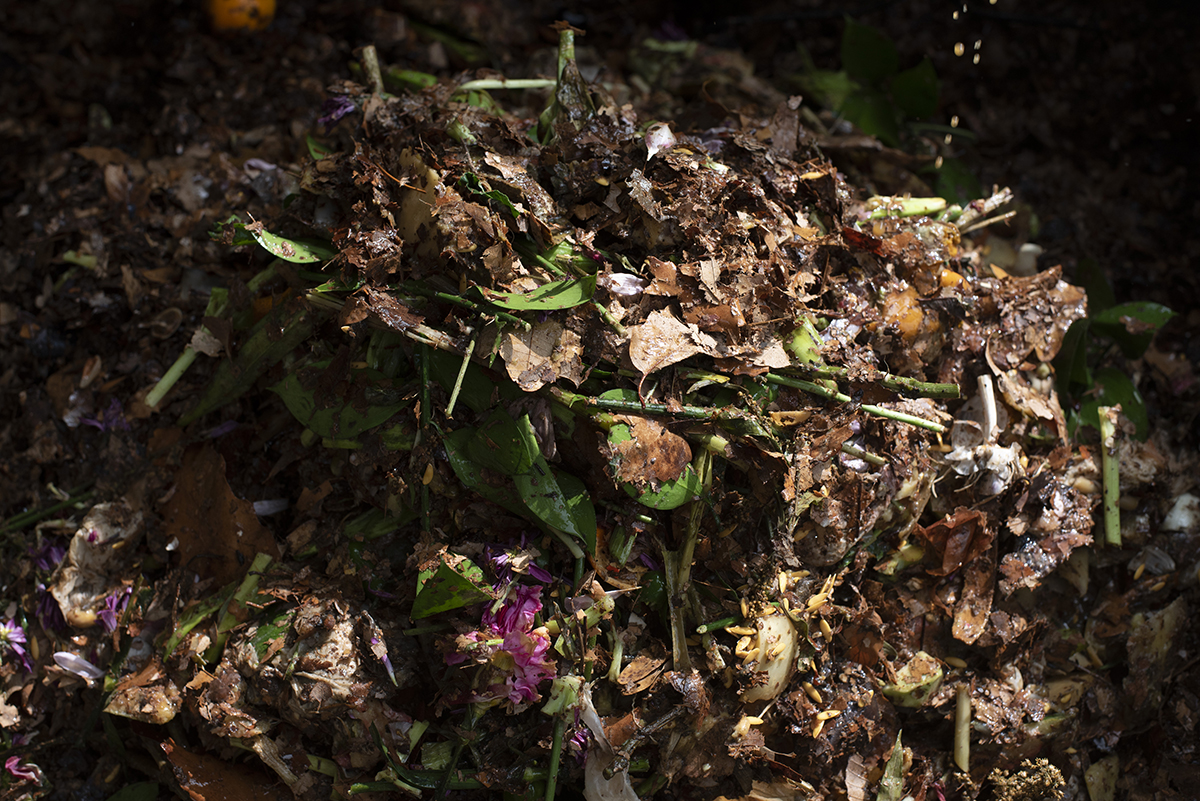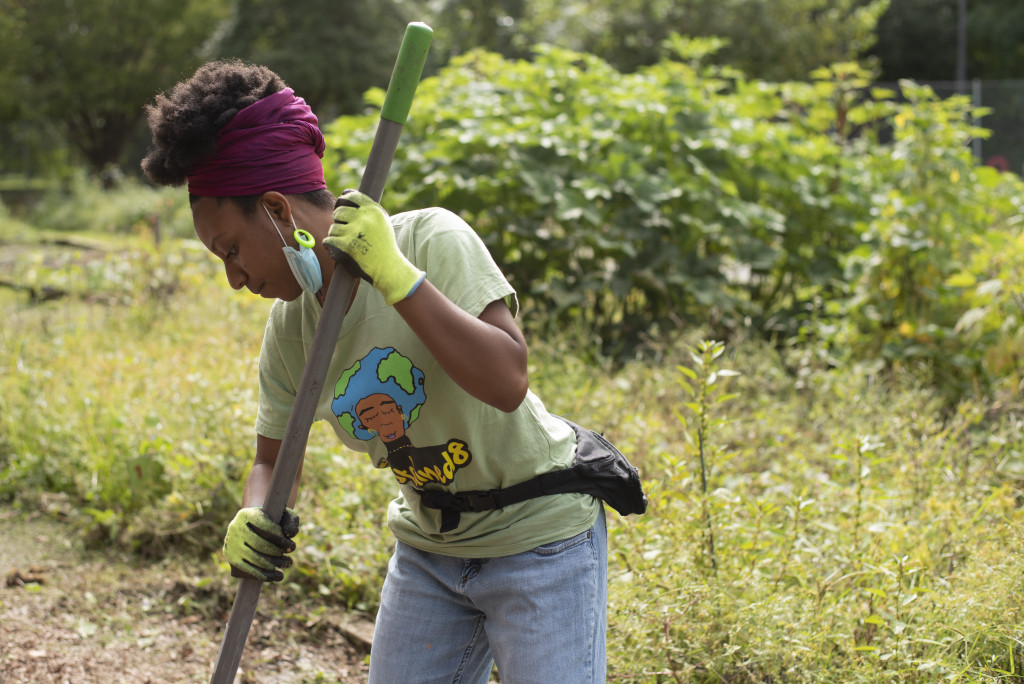
New materials are added to a compost pile at Lederer Gardens in Washington, D.C., on Sept. 15, 2020. (Photos by Arielle Bader/George Washington University)

New materials are added to a compost pile at Lederer Gardens in Washington, D.C., on Sept. 15, 2020. (Photos by Arielle Bader/George Washington University)
Our culture is pretty food-obsessed. There are hundreds of thousands of restaurants and grocery stores in the United States. Americans celebrate food with museums honoring ice cream, SPAM, Jell-O, and many more. Consumers, businesses, and government organizations combined spent $1.77 trillion on food in 2019, according to the USDA. And there’s even a saying, “phone eats first,” referring to the habit of photographing a meal before digging in. Despite our obsession with food, we throw so much of it away — an estimated 30%-40% ends up wasted.
Once you’re done with your banana, what happens to the peel if it sits in a plastic trash bag? The natural breakdown of food slows immensely when leftovers end up in a landfill or on the sidewalk. If you want to make a change that will help the planet, look no further than your own food scraps.
“Composting is essentially a renewal process. It is a verb and it’s a noun,” said Najwa Womack, a D.C. native who has been composting for the past seven years. “The action of composting is actually monitoring the decomposition process of organic materials, and what you come out with is a very nutrient-dense soil amendment.”
Womack runs Sistained 8, an action step movement that increases awareness around environmental sustainability and teaches the community about composting. She admits that at first people may be wary of the smell, but they are almost always impressed with the end result.
Composting is an aerobic process, meaning it requires oxygen. In this process, organic material is heated and breaks down into nutrients which enrich soil and results in much lower carbon dioxide production, compared to the lengthier breakdown process in a trash bag.
“You probably heard about methane when it comes to animal waste and pig manure, and too much of it can cause an issue. So that’s also the case with food waste going inside of plastic bags. It has been very harmful over time to the planet. It’s literally trapped methane gas that could be decomposing naturally,” Womack said.
In the U.S., the third-largest source of methane comes from landfills. This means every time food goes into the trash can, the release of methane increases, heating up the earth and furthering the climate crisis.
“Composting is an easy, fascinating, and natural way to recycle,” writes Rhonda Sherman, an Extension Solid Waste Specialist at North Carolina State University, in a backyard composting publication.
For those who don’t have outdoor access or prefer to be more hands-off, one method involves leftovers and a freezer. After cooking, throw any food scraps in a compostable bag (paper works too) or reusable container. Organic materials like grass or house plant clippings, paper products, coffee grounds, tea bags, and more can be added.
With this “freezer method,” there are no requirements for what or how many scraps get frozen. It all depends on what you have available. And that’s it, you’ve started composting! Once the bag is full you will need to do a little research about your town. Drop off your compost at a municipal facility or pay a small fee to have it picked up by a service. Some farmers markets and universities also offer free composting programs to the public and handle the decomposition process at a dedicated facility.
The other option is to be involved in the composting process from start to finish. Start your pile on the ground or place your bin in a shaded area, so it stays moist. Here you must have two main components — your browns and your greens. Browns are dried leaves, newspapers, cardboard, twigs, etc. They absorb moisture, help keep your compost pile structured, and are sugar-rich carbon sources. Greens are your leftover food discards like fruits, veggies, and even your coffee grounds. Greens help provide moisture for microorganisms and are protein-rich nitrogen sources. You should aim for a browns to green ratio of about 70 to 30. Note that it is best to avoid adding meat and or dairy products as they don’t decompose well in a traditional compost pile, and can attract bugs.
Is it possible to compost meat and dairy? Yes! “They can be placed in an in-ground digester, such as the Green Cone,” according to Sherman from NC State. Some municipal composting programs also may allow them. If you use the freezer method and have meat and dairy leftovers, check with your drop-off program for their specific guidelines.
As for the size of your compost pile, it should reach three to five feet in height and at least three feet in diameter. This is key to having the pile retain heat and be self-insulating, which decomposes the materials. Alternate between layers of browns and greens or mix them very well and the breakdown process will happen naturally. To speed up the composting process, add water to keep it moist and turn the pile frequently. Chopping your leftovers into smaller pieces doesn’t hurt either.

To avoid having excess food overall, Womack says the first step is awareness, and to study your own eating patterns. From there, one can shop smarter and label your food with dates to monitor your food consumption. Even with a perfect harvest or shopping list, there inevitably will be leftover inedible parts — and that’s where the sustainable practice of composting comes in. The resulting nutrient-rich amendment regenerates soil, optimizes the taste of the crops, and can decrease pathogens.
Womack finds composting “very solution-based … You are a single ambassador and if we have enough people — more than enough — ambassadors doing that activity, we’ll start to see a lot more change.”
Composting is a quick change one can make at home that truly benefits the earth and improves soil health, with options to dedicate as much or as little time as you have.